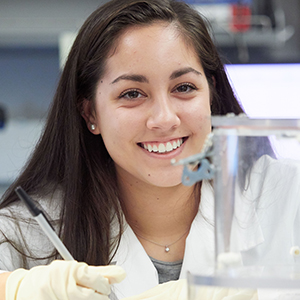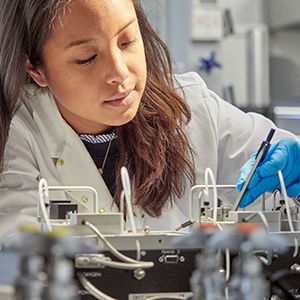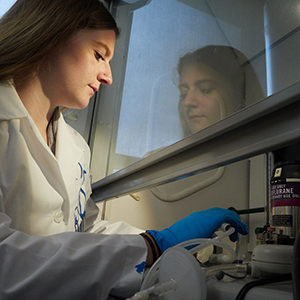Lara DeRuisseau, Ph.D., had an uncle with Duchenne’s Muscular Dystrophy, a medical condition characterized by severe muscle weakness and respiratory problems. While DeRuisseau never met him, she learned how those health issues affected him over the course of his life. His story would help to shape DeRuisseau’s own, as would that of a close childhood friend who was born with a heart-lung condition. They remained on DeRuisseau’s mind as she asked herself what she wanted her contribution to the world to be. Then, in that particular space where passion meets need, DeRuisseau found her answer: by engaging in research that leads to understanding heart-lung pathologies.
 Today DeRuisseau leads a team of high school, undergraduate and graduate students, along with a post-doctoral fellow, in conducting research that they hope will aid the approximately 40 percent of people living with Down syndrome who suffer from sleep apnea, in which the airway becomes blocked repeatedly during sleep. Sleep apnea has been shown to affect cognitive abilities, behavior and growth rate. Even more alarming, it can lead to abnormally high blood pressure in the arteries of the lungs or failure of the right side of the heart. DeRuisseau and her team hope that through their work they can better understand the mechanisms of breathing and blood pressure in Down syndrome, while also training the next generation of scientists.
Today DeRuisseau leads a team of high school, undergraduate and graduate students, along with a post-doctoral fellow, in conducting research that they hope will aid the approximately 40 percent of people living with Down syndrome who suffer from sleep apnea, in which the airway becomes blocked repeatedly during sleep. Sleep apnea has been shown to affect cognitive abilities, behavior and growth rate. Even more alarming, it can lead to abnormally high blood pressure in the arteries of the lungs or failure of the right side of the heart. DeRuisseau and her team hope that through their work they can better understand the mechanisms of breathing and blood pressure in Down syndrome, while also training the next generation of scientists.
 Their work is supported by more than $500,000 in funding from the National Institutes of Health (NIH) which is awarded to both Le Moyne College and Syracuse University. The funding includes an Academic Research Enrichment Award (AREA) from the NIH as well as two Research Supplements to Support Diversity in Health-Related Research. The AREA Program supports meritorious research, exposes undergraduate and graduate students to hands-on research in eligible environments, and strengthens the research environment of schools that have not been major recipients of NIH support. The supplements are being used to reach an NIH goal of increasing the diversity of the science workforce by supporting undergraduate, doctoral and post-doctoral candidates in health-related research. The funding has been nothing short of “transformative,” particularly at a time when financial support for these kinds of initiatives is incredibly low, DeRuisseau said. This award from the NIH speaks to the quality of work being performed in it. Most important, the grant allows DeRuisseau to train more students than ever before, with more advanced techniques.
Their work is supported by more than $500,000 in funding from the National Institutes of Health (NIH) which is awarded to both Le Moyne College and Syracuse University. The funding includes an Academic Research Enrichment Award (AREA) from the NIH as well as two Research Supplements to Support Diversity in Health-Related Research. The AREA Program supports meritorious research, exposes undergraduate and graduate students to hands-on research in eligible environments, and strengthens the research environment of schools that have not been major recipients of NIH support. The supplements are being used to reach an NIH goal of increasing the diversity of the science workforce by supporting undergraduate, doctoral and post-doctoral candidates in health-related research. The funding has been nothing short of “transformative,” particularly at a time when financial support for these kinds of initiatives is incredibly low, DeRuisseau said. This award from the NIH speaks to the quality of work being performed in it. Most important, the grant allows DeRuisseau to train more students than ever before, with more advanced techniques.
 As for what draws those students to DeRuisseau’s lab on the second floor of the Coyne Science Center, that is both simple (a desire to learn) and complicated (a longing to contribute to the body of knowledge). The crux of their work is to research the breathing patterns of Ts65Dn mice, a model for studying Down syndrome. The members of DeRuisseau’s lab begin by reading the appropriate scientific literature so that they have a firm grasp on the work that has already been done. Then they move on to learning and troubleshooting techniques, along with data analysis, interpretation and writing. While the work can be incremental, even the smallest step is critical in biomedical research.
As for what draws those students to DeRuisseau’s lab on the second floor of the Coyne Science Center, that is both simple (a desire to learn) and complicated (a longing to contribute to the body of knowledge). The crux of their work is to research the breathing patterns of Ts65Dn mice, a model for studying Down syndrome. The members of DeRuisseau’s lab begin by reading the appropriate scientific literature so that they have a firm grasp on the work that has already been done. Then they move on to learning and troubleshooting techniques, along with data analysis, interpretation and writing. While the work can be incremental, even the smallest step is critical in biomedical research.
“There is so much to learn in a lab that it can be overwhelming at first,” DeRuisseau said. “I try to break everything down into manageable pieces. It’s wonderful to watch a student go from trying a technique for the first time to presenting their data on a national stage and finally publishing in a peer-reviewed journal.”
As a mentor, DeRuisseau aims to create safe space for students to learn, and to provide them with the support and resources necessary to grow as scientists. That includes not only supplies and time, but also helping students recognize that a critical component of science is presenting findings to others and forming a network of colleagues. DeRuisseau leads her group with a mentoring cascade, meaning that more experienced trainees mentor those at different academic levels. With this system, students have DeRuisseau as a primary mentor, but also have peer mentors for day-to-day operations in the lab.
As they become more confident in techniques and analyses, the students take on increasing leadership roles. Former lab member Ashley Loeven ’18 won the American Physiological Society Horwitz/Horowitz Outstanding Undergraduate Abstract Award and Excellence in Undergraduate Research Award at Experimental Biology 2018, an annual conference that draws more than 14,000 scientists from around the globe. She is now pursuing a doctorate in cellular and molecular biology at the Florida State University. Current lab member Brianna Eassa ’19 also presented her research at Experimental Biology. She received a prestigious Summer Research Fellowship from the American Physiological Society that allowed her to continue her work in DeRuisseau’s lab over the summer.
“This research experience gives undergraduates in Dr. DeReuisseau’s lab the opportunity to blossom as student scholars, as our president often calls them,” said Kate Costello-Sullivan, dean of the College of Arts and Sciences. “Their success is a testament not only to the quality of students who attend Le Moyne, but also to the attention and talent of their faculty mentors. Our students prove time and again that, with their natural gifts and the education they receive here, they can compete with anyone anywhere.”
Perhaps the most meaningful aspect of the work is how closely it aligns with the College’s mission. First and foremost, the lab is training a diverse group of students more representative of the nation’s population. Second, educating the whole person is a part of any research mentoring. Within her group, DeRuisseau focuses on teaching students basic scientific techniques and reading the literature. Then she encourages them to make their own interpretation of their data. Their greatest hope is that their work will help society by advancing understanding of people living with cardio-respiratory concerns.
“The most rewarding part for me is watching students develop into scientists and ultimately becoming a peer,” DeRuisseau said. “When students move onto the next stage of their career, it’s fantastic for them to find they are ahead of the curve!”
Recent (2018) peer-reviewed publications from the DeRuisseau Lab with undergraduate co-authors. (Italics indicates undergraduate students.)
- Candace N. Receno, K.E. Roffo, M.C. Mickey, K.C. DeRuisseau, L.R. DeRuisseau. Quiet breathing in hindlimb casted mice. Respir Physiol Neurobiol. 2018 Jun 7. pii: S1569-9048(18)30140-X. doi: 10.1016/j.resp.2018.06.003. [Epub ahead of print] PMID: 29886246
- Candace N. Receno, T.G. Glausen, L.R. DeRuisseau. Saline as a vehicle control does not alter ventilation in male CD-1 mice. Physiol Rep. 2018 May;6(10):e13702. doi: 10.14814/phy2.13702. PMID: 29845772
- Ashley Loeven, C.N. Receno, C. Cunningham, and L.R. DeRuisseau. Arterial Blood Sampling in Male CD-1 and C57BL/6J Mice with 1% Isoflurane is Similar to Awake Mice; Journal of Applied Physiology. Volume 125; No. 6. Dec 6, 2018.